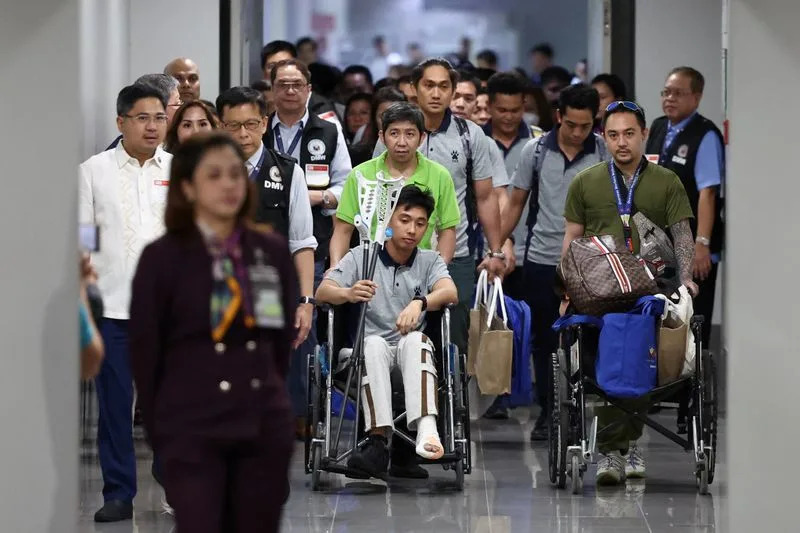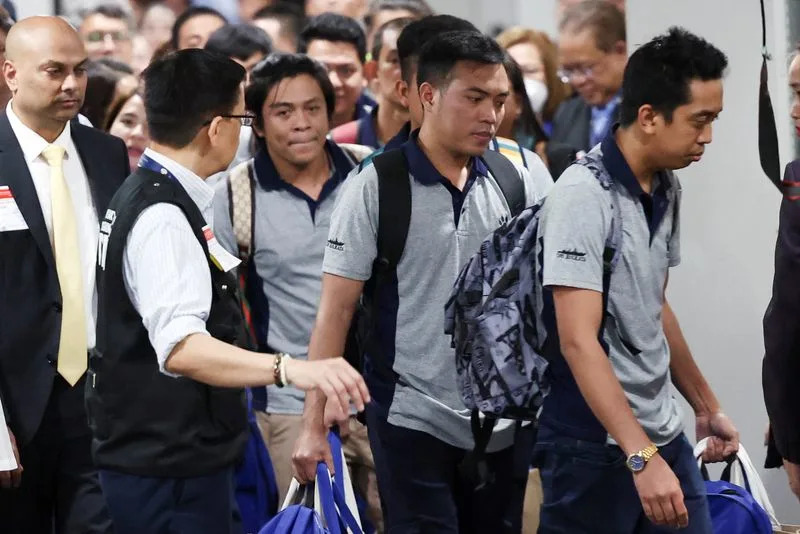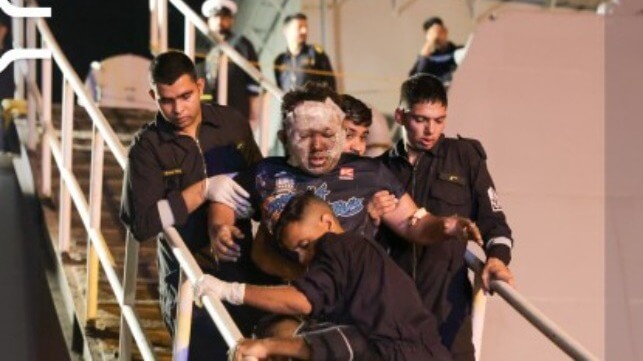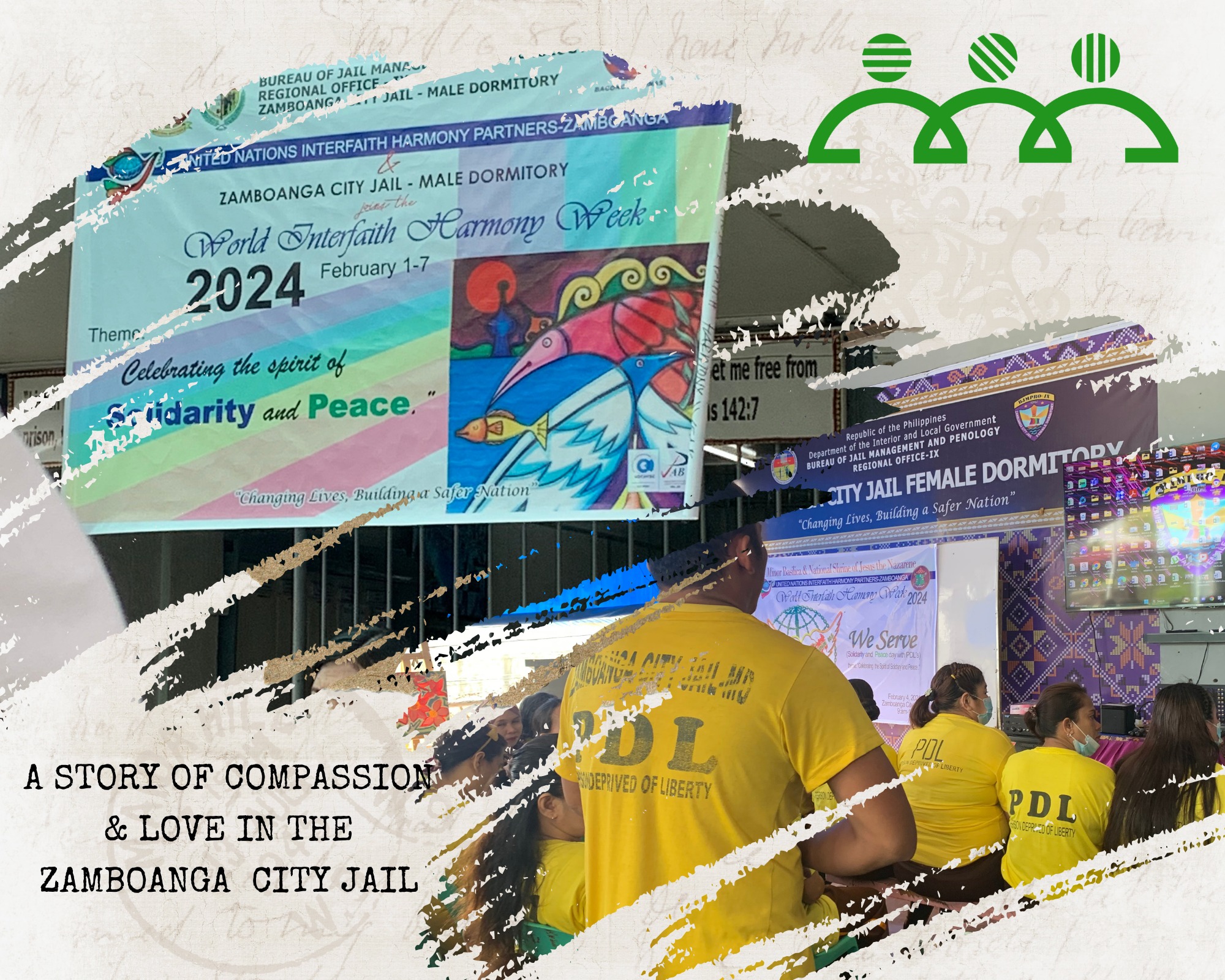Tue, March 12, 2024


Filipino seafarers who survived the deadly Houthi attack on the commercial ship True Confidence arrive at Manila International Airport
By Jay Ereno and Eloisa Lopez
MANILA (Reuters) - Eleven Filipino seafarers arrived in the Philippines on Tuesday nearly a week after they survived a Houthi missile attack off Yemen.
They were crew members of the Barbados-flagged, Greek operated merchant ship True Confidence which the Houthis attacked last week, killing three sailors, including two Filipinos. The migrant workers' ministry said in a statement the 11 survivors received government help on arriving in Manila.
Mark Anthony Dagohoy, a crew member on True Confidence, said it was difficult to recall what they went through, but he was thankful for the military personnel who rescued them.
"We just want to be with our family," Dagohoy told a press conference.
Officials said two other Filipinos who sustained major injuries were recovering in a Djibouti hospital. Once cleared medically, they will be flown back to Manila.
The Houthis have been attacking ships in the Red Sea since November in what they say is a campaign in solidarity with Palestinians in the ongoing war in Gaza.
The attacks have disrupted global shipping, raising costs as companies have been forced to re-route to longer and more expensive journeys around South Africa.
Foreign affairs undersecretary Eduardo de Vega said on Tuesday the Philippine government has also reached a deal with the International Transport Workers Federation for Filipino seafarers to have the right to refuse deployments in high-risk areas.
The Philippines is a major source of seafarers for the global maritime sector. They are among millions of overseas Filipinos sending home more than $2.5 billion each month, boosting consumer spending which drives growth in the domestic economy.
(Reporting by Eloisa Lopez and Jay Ereno, Editing by Ed Osmond)\
11 Survivors of Houthi Missile Attac Return Home, Two Remain in Hospital

The surviving crewmembers of the bulker True Confidence have begun to return to the Philippines, and 11 of them arrived in Manila on Tuesday.
With financial assistance from the Philippine government, the survivors flew home from the port city of Djibouti, arriving to find a press conference and a formal welcoming committee. Two other survivors who were badly injured in the attack are still in Djibouti, receiving hospital treatment, and will be repatriated once they recover. All of the survivors have received about $1,000 in cash aid from officials at the nearest Philippine embassy (Cairo).
One of the survivors had to have a leg amputated, according to ISWAN - an injury that usually rules out a return to the seafaring life.
The bodies of three deceased crewmembers remain aboard the damaged ship, and recovery of the remains will have to wait until the vessel is towed to the coast for salvage, according to the Philippines' Department of Migrant Workers. A salvage tug has been chartered for the task, and the job carries unusual risks: a French frigate had to defend the salvors from a renewed Houthi drone attack last weekend.
17 Filipino seafarers from the hijacked car carrier Galaxy Leader remain in Houthi custody, and while they are alive and safe, the Philippine government's monthslong attempt to negotiate their release has been unsuccessful. “The Houthis are consistent in their statement that it would need an end to the war in Gaza before they will release the ship or seafarers,” Philippine migration official Eduardo Jose de Vega agency said at a briefing Tuesday.
Because of the ongoing safety risk from Houthi attacks, seafarers' union Nautilus has called on shipowners to reconsider whether they have an essential need to navigate through the Red Sea, or whether they could take the long way around the Cape of Good Hope instead. Traffic on the Red Sea-Suez route has fallen by roughly half since December, according to the Suez Canal Authority and the IMF PortWatch program, but roughly 30 ships a day still continue to transit the high-risk zone off Yemen.
Hundreds rescued from love scam centre in the Philippines
Virma Simonette & Kelly Ng
Thu, March 14, 2024

Hundreds of people have been rescued from a scam centre in the Philippines that made them pose as lovers online.
Police said they raided the centre on Thursday and rescued 383 Filipinos, 202 Chinese and 73 other foreign nationals.
The centre, which is about 100km north of Manila, was masquerading as an online gambling firm, they said.
South East Asia has become a hub for scam centres where the scammers themselves are often entrapped and forced into criminal activity.
Young and tech-savvy victims are often lured into running these illegal operations, which ranges from money laundering and crypto fraud to so-called love scams. The latter are also known as "pig butchering" scams, named after the farming practice of fattening pigs before slaughtering them.
These typically start with the scammer adopting a fake identity to gain their victim's affection and trust - and then using the illusion of a romantic or intimate relationship to manipulate or steal from the victim. This often happens by persuading them to invest in fake schemes or businesses.
Lured and trapped into scam slavery in South East Asia
The Chinese mafia's downfall in a lawless casino town
Thursday's raid near Manila was sparked by a tip-off from a Vietnamese man who managed to flee the scam centre last month, police said.
The man, who in his 30s, arrived in the Philippines in January this year, after being offered what he was told would be a chef's job, said Winston Casio, spokesman for the presidential commission against organised crime.
But the man soon realised that he, like hundreds of others, had fallen prey to human traffickers running love and cryptocurrency scams.
Those trapped in the Bamban centre were forced to send "sweet nothings" to their victims, many of whom were Chinese, Mr Casio said - they would check in on their recipients with questions about their day and if and what they had eaten for their last meal. They would also send photos of themselves to cultivate the relationship.
Mr Casio said those running the scam centres trapped "good looking men and women to lure [victims]".
On 28 February, the Vietnamese man escaped the facility by climbing up a wall, crossing a river, and seeking refuge at a farm. The farm owner then reported it to the police.
There were signs of torture on the man, including scars and marks from electrocution, said Mr Casio, whose team visited the man early this month.
Mr Casio added that several others have tried to escape but were always caught.
Police also seized three shotguns, a 9mm pistol, two .38 calibre revolvers, and 42 rounds of live ammunition from the centre.
Authorities are still in the initial stages of the investigation as most of those rescued from Thursday's raid are still "shaken", he said.
In May last year, Philippine authorities rescued more than 1,000 people who were held captive and forced to run online scams inside a freeport zone in Clark, a city also north of Manila - in what remains its biggest bust to date.
A UN report last August estimated that hundreds of thousands of people from around the world have been trafficked to Southeast Asia to run online scams.
The BBC has previously spoken to people who have fallen victim to these criminal networks.
Many have said they travelled to South East Asian countries such as Cambodia and Myanmar in response to job ads and promises of perks. They are trapped once they arrive, and threatened if they refuse to participate in the scams. Escapees and survivors have alleged torture and inhuman treatment.
Governments across Asia, from Indonesia to Taiwan, have expressed alarm at the rise in these scam centres. Foreign embassies in countries like Cambodia and Thailand, for example, have issued warnings to their citizens to beware of being lured into scam centres.
China issued public rewards for warlords who were running scam centres across the border in Myanmar - these centres were run by Chinese mafia families and targeted Chinese nationals. Many of those arrested have been handed over to China in recent months.
by Santosh Digal
03/14/2024, 14.20
PHILIPPINES
The movement for interreligious dialogue founded in Mindanao by Fr Sebastiano D'Ambra, a PIME missionary, is also active in offering prisoners training courses for when they regain their freedom. But because of the slow pace of the Philippine justice system, many remain in prison longer than they should. "I pray that during this Lenten period they can be released," said Giljohn G. Rojas, coordinator in Zamboanga prison.

Manila (AsiaNews) - For 30 years the Silsilah Dialogue Movement has been bringing hope, compassion and love to the inmates of the Zamboanga City prison in the province of Zamboanga del Sur, in the southern Philippines.
The activity in favor of prisoners is one of the faces of this initiative for interreligious dialogue in Mindanao: founded by the PIME missionary Fr. Sebastiano D'Ambra in 1984, Silsilah (which means "chain") sees Christians and Muslims working together in many areas of social life.
“We continue to carry out our mission by inviting other Silsilah members from different cities to pay attention to this specific mission,” said Giljohn G. Rojas, staff member and new prison ministry coordinator at Zamboanga Prison. "We collected the testimonies of people deprived of their liberty who shared with us how they were transformed and how, thanks to the project carried out by Silsilah, their time in prison was reduced", he said.
Silsilah works with institutions, police and volunteers providing training courses to reduce prisoners' sentences and prepare them for reintegration when they return to freedom. “In the first few days of visiting the prison, I was eager to talk or interact with the prisoners.
In addition to being uncomfortable at the time, I felt conflicted, anxious, fearful, and ashamed. Little by little, those apprehensions disappeared and gave way to mutual trust,” said Rojas, who, trying to show solidarity with the prisoners, began “wearing colors similar to those of the prisoners' uniforms.”
The coordinator of the movement in Zamboanga underlined the importance of treating prisoners with love and respect: “They are our brothers and children loved by God, even if not impeccable. They need God's mercy and our compassion, just as each of us is imperfect. With all our flaws, we are loved. Each of us is loved,” Rojas said.
Some cases are more harrowing than others, such as that of a man sentenced to eight years, but who, due to the length of the judicial process, has been in prison for much longer: "I have not been able to look this prisoner in the eyes, who continues to feeling like he wasn't allowed to live his life, even after serving more than double his allotted time. He's getting older, and I've been thinking about what chances he would have of surviving outside prison walls if he were released. I believe that he was denied not only freedom, but much more."
Many cases are still pending or proceeding too slowly. Many prisoners cling to the hope that one day they will return to society, but they do not know whether they will be accepted or have the opportunity to work or study again.
Or simply whether they will be given a second chance because of their past. “Now I understand why Jesus specifically mentioned visiting incarcerated people as a work of mercy: because it is a gesture towards him,” Rojas continued. “Even though they have committed crimes, they are more than just criminals. They are human beings, made in the image and likeness of God."
"I pray that in this period of Lent they can leave prison", continued the coordinator. "We often close ourselves off to avoid needing people and also that people need us. Because of our conceit and self-interest, we confine ourselves. And so we also end up imprisoned in this prison of our own creation. I pray that we can be free to love those who are loved by God, who are the most neglected by our society.”
No comments:
Post a Comment